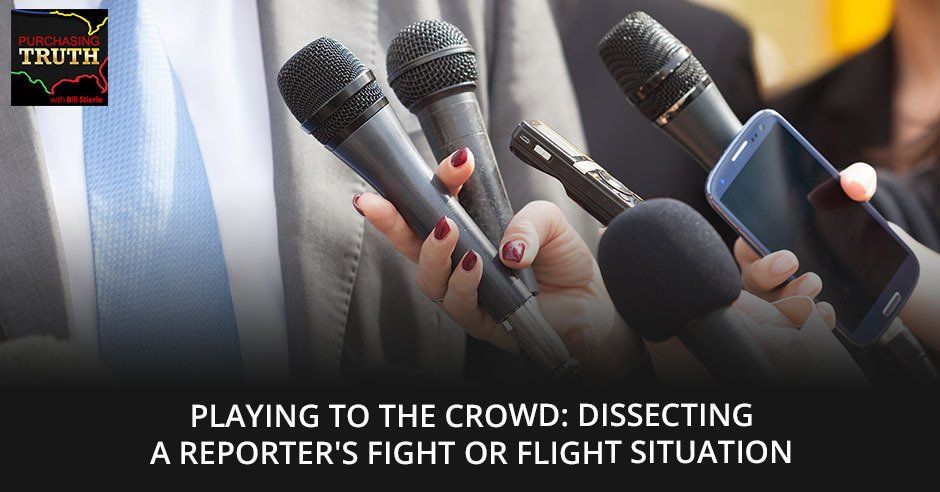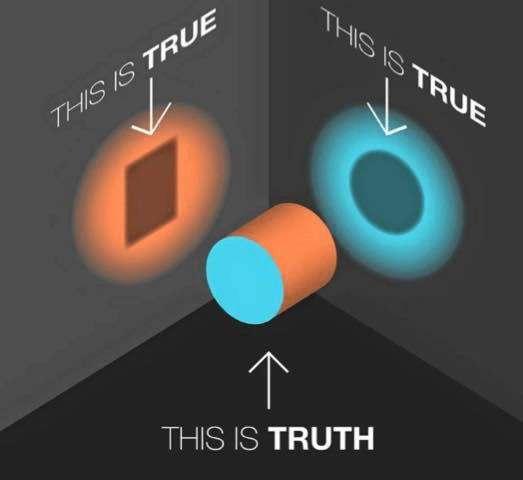Playing To The Crowd: Dissecting A Reporter's Fight Or Flight Situation
Subscribe Today!
When people get into a fight or flight situation, truth is sacrificed in favor of comfortable, yet false, positives. Bill Stierle and Tom dissect Gary Tuchman's conversation with Pennsylvania Republican State Sen. Doug Mastriano, focusing on the reporter's struggle to control the conversation. They discuss how people go to great lengths to challenge the truth just for the sake of getting one controversial soundbite. Emphasizing the power of compassion and empathy in public perception, they explain how these forces can be used to get out of a tight spot. Bill and Tom also detail how this particular scenario illustrates how the human mind's logical side completely shuts down when overridden by emotions and personal beliefs.
---
Watch the episode here
We've got an interesting topic for you. We're going to talk about truth and how a reporter can disperse the crowd. We have a specific video of a CNN reporter who was engaging at Pennsylvania state lawmaker, who has been elusive to the media. When he finally got him and had an opportunity to ask him some questions, he seemed to do more than ask questions. He seemed to be trying to persuade this person that some of the things that he's been saying are not true. That's where it tries to go off the rails.
It's my need for awareness and skill that the reporter doesn't stay in their lane. They're looking to prove and/or validate and/or elicit a reaction from the congressperson that they're talking to. That person is then doing the same so that somewhere in there, there's going to be a piece of footage that will go viral. This is when the narrative shows up as fake news. When we use communication in order to raise the emotion inside the listener, this is where the problem takes place because fake news becomes an assault on truth. Tom, you and I have had many different experiences and discussions around truth. There's been two graphics that we've used to describe truth in the past.
We'll probably figure out what episodes those were in so people can read those. One of them has to do with truth perspective. I put it on the chart. It's a little bit down on our document there. The truth perspective is that where we look at this cylinder and the cylinder cast two different projections. One observable is a circle and the other observable is a square by the way the light is shining on the cylinder. This is problematic because when we start talking about beliefs and points of view, that's what happens to truth. It gets split between what is the circle version of truth and what is the square version of truth. This is what the reporter got stuck in.
He had an agenda. He did and wanted this person to be clear. We have the video at PurchasingTruth.com for those of you who want to see it. The reporter, who was named Gary Tuchman had a conversation with Pennsylvania Republican State Senator Doug Mastriano. He went into this conversation not just asking a couple of questions, which he did do but very quickly, the state senator felt like, "Wait a second there. You see how you got partisan on that? You started to reveal your bias."
He didn't use that word but the state senator was telling him, "You started to reveal your bias." The reporter kept coming back to him with facts like, "There are 61 lawsuits that have been ruled, and a lot of them by Donald Trump appointed judges that say there was no fraud in the election." That was one fact. He comes out of him with, "What about the Supreme Court ruled on some of these things?" It's another fact. It was very interesting to see how this guy deflected, spun that, and use the crowd around him, Bill. Wasn't that wild?
He did. He looked around and says, "Who is the person that decides upon these things?" The state senator was looking around and goes like, "The people decide." What the problem was is that he said, "Would you like the people decide? Would you like a certain group of nine people or would you rather have nine people that are looking at a common law that were in agreement with? Which one would you like there? The people are voting to get the world to go the way they would like to go." What winds up happening is we're back into this dynamic of, "Is it the circle from the cylinder or is it the square from the cylinder?" Immediately, it causes the cortisol and adrenaline to go up inside all of the listeners. You've got a fight or flight experience that allows the listener to discard all facts coming out of your mouth. That's what it allows them to do.
“You're wrong. We're right. We're right because we believe we're right. We may not have any evidence, but we're looking for it because we have the anticipation that raises dopamine and adrenaline when you say we're looking for.” Tom, we're coming to our house. I know someone has buried treasure in your backyard. The person that used to own your house was a gangster. We found out that possibly there is a suitcase with $100,000 in your backyard. As soon as I say that, even though I made it up on the spot, the anticipation in your body went up, even though your logical brain knows and I even told you that I made it up.
It changed my brain chemistry. I can feel it, Bill. I'm like, "Wouldn't it be great if there was a suitcase with $100,000 in my backyard?" It has an actual physical change in my body.
I made it up on the spot. We have this reporter who does not know what they're doing. They think that their job is to find a got you moment or some film clip where the person is going to meander and look not very powerful. Meanwhile, it's unsettling because the things that they're saying are enlisting the fight, flight, and freeze response. It’s generating and cultivating that through a series of tragic language of, "Here's a reward. Here's anticipation and here's uncertainty." What is the uncertainty? Tom, I have it. Experts have told me. There was a court case revealed that there was a gangster who lived at your house and had $100,000 that they were never able to find. I have it under good advice. There's an important person that said that. If you want to even see this in a big time like the Rudy Giuliani call to the Ukrainian folks, it's loaded with this type of language.
There's a notable person that said there's somebody but we're not quite sure yet. We do have it and if you could bring the announcement. If you can fly the trial balloon for us, we'll keep hitting the balloon up in the air, so everybody keeps looking at the balloon. Meanwhile, we're going to keep everybody in doubt and skepticism and then cause the level of confusion we would like in order to keep voters where we'd like them to be, looking at the truth. You can see unsettling it is. The reason why how the reporter could disperse the crowd is to provide compassion and empathy for all the people that are standing there, even the state senator.
He's a state senator from Pennsylvania. Let me say what the reporter did. After he talks about the Supreme Court, he at one point says, "There's no higher authority than Supreme Court. Who has a higher authority than the Supreme Court?" The state senator turns to the crowd and says, "Who has more power than the Supreme Court?" Everybody around them start saying, "The people do." That was how he started. The reporter made a bigger mistake in saying that, "Take Arizona. There were two recounts in Arizona already and there's one with Cyber Ninjas who's not even an accredited and experienced auditor of things." He wants to try to convince the state senator to agree that Cyber Ninjas is not a credible auditor. What he does, which you'll see in the video, readers, if you go watch it in PurchasingTruth.com, is he says back to the reporter, "You don't want transparency. You don't want another audit." This is where the reporter created that fight and flight reaction.
The reporter did not handle that back very well. The thing that the reporter needed to say is saying, "You would not like transparency." He needed to empathize it themselves. I feel doubtful and skeptical with a group that doesn't have any experience and they don't meet my need for truth because they don't have any experience in doing stuff like this. It's like having a group of high schoolers come in and look at the documents because you would say, "We're going to take a look at their truth." I felt doubtful and skeptical that they would ever come up with an answer that you would be satisfied with. I want the answer that you want to be satisfied with but I also want to have skilled people there. I do want transparency. Thanks for asking. Can you imagine for reporter owns the word transparency? It seems like you didn't like the transparency from the other two votes. You didn't like the outcome there. You would like in your group of people here but rather prefer a different outcome. You're looking for a different outcome. You're not interested in the two audits that took place as a version of truth.
They would be dumbfounded.
That's the emotion I want. I do not want anger, aggravation, passion, and irritation to be in the environment. I want confused, doubt, and skeptical with their own beliefs. You voted for the other folks to be there and the people in the State of Arizona struggle with trust. This group struggles with trust and it looks like you're going to keep looking around until you find your version of truth.
Take a departure point where that state senator says, "Who does the Supreme Court have to answer to?" That was one of the things he said to his crowd and they say, "The people." How do you emphasize with them?
The reporter has to empathize with the people. A reporter says, "You would like me to hear that the people have the ultimate decision in the voting booth. Is that correct?" “Yes.” "You also have the thought that the people are very good in interpreting the laws that we've agreed upon. Is that correct? That means nine people here can be as good as the Supreme Court. Should we do it that way?" Challenge and step through the belief with empathy and compassion. Challenge and empathize with them.
Not to prove the person wrong, they would say, "I get it. You don't like the outcome. As a CNN reporter, I'm here to report how much you don't like the outcome. I'm interested in hearing how you don't like the outcome." You're asking a group of people to find a different outcome. You would like a different outcome. "How many people would like Donald Trump to be here?" “Yay.” "You would like a different outcome for this." If we had more people that didn't vote your way, then would that be okay? If the other person that you didn't like got there because there were more people that didn't like the way you would like things, would that be okay?
There's no rigor once we moved to the limbic part of the brain, once that fight, flight, or freeze and the ultimate faint and withdraw shows up that people use. We struggle because we want something so badly. We're interested in the false positive because it validates what we think is true. The reporter can disperse the crowd by using language to reduce what is happening in that environment and give the Republican an off-ramp. The Republican needs their off-ramp because he doesn't have one. All he has to do is fight in a certain way to keep the engagement in order to get votes for the people who believe the false positive. It's unsettling. There are little traps, so he has to look right and left. If he wants to keep his job, he can't look right and left and go like, "After this audit, I'm going to accept the results." That's not coming out of his mouth. What's coming out of his mouth is they must have missed something. That starts the entire cycle again.
It starts the uncertainty. That's the fishing lure you throw 1, 2, 3, 4, 5 times in the same spot. At the fifth time, the fish comes out and bites that damn lure. The fish is on the hook. This is a problem with messaging that has propaganda feel to it. It's hooking into a person's belief structure and the person can't let go and kick it off the hook because they've already agreed in the illusion of the lure. It's hard not to take the lure because we want it so bad. We've invested so much in the Donald Trump lure. Regrettably, it's artificial. If we look at it as an artificial lure, it makes it easier to see how he's casting the line with sentences. We should do the North Carolina speech that he gave too. He kept casting the lure out with vague and illusionary statements. People were on the hook and they couldn't wriggle off.
This is about where Former President Donald Trump speaking to North Carolina is talking about the Arizona audit and the Georgia audit. We'll see what happens into uncertainty.
Some people are saying, "I'll be put back in office." There's no mechanism for that. There might have been a mechanism if the court cases would have found fraud and would have found it at the great level. That's what happened with Gore v. Bush or the Florida vote. Gore said, "For the good of the nation, you go. I'm going to take a step back here. I am not putting all of us through this." That's called the good of the nation. That's taken one for the team. He took one for democracy.
He put democracy over party and his own personal interest. He fought it very far through the Supreme Court. They came down and stopped the recount.
They also stopped the recount in the Florida Republican gal. What was her name?
Pamela Bondi. She was at the time, the Secretary of State.
She's going like, "We're not recounting." It's like, "It was close. You may want to take a look at this and do that." Think about that not recounting at all. Meanwhile, think about this from a truth perspective. Georgia recounted three times. Arizona recounted two times and they still don't believe it. Take a breath on that. They were looking to make sure and they validated the results. The belief and the narrative are overriding truth. It's very unsettling. I know you and I are extending trust that those three recounts and those two recounts were done with high integrity. I know that we're doing that. I know that you and I don't have firsthand knowledge and information.
I know that my belief is saying, "I'm going to give it a push because I'm trusting democracy." I trust the Republicans that counted it in Georgia three times. I trust the recounts in Arizona. I know that I'm extending out on the plank to do that. At the same time, I'm also extending trust to the courts. If 50 of those court cases would have been, "Wait a minute," I would be on that side. I'm extending trust there, too, but it's the same thing. The limbic brain overrides the front part of the brain. Emotion, habit, and belief always wins over logic and future-thinking because that's the way the brain keeps us alive.
Which is exactly why if you're a reporter, you cannot combat beliefs with facts.
You cannot compete. You cannot do it. Even the news reporters, when it got kicked back to them, they did the same thing. They infuriated and gave more talking points. Logic, habit, and beliefs always wins over logic and future-thinking when the person's emotions arise. The logical brain shuts off. The future-oriented brain goes into the tank.
What's scary is some of the reporters who aren't even real reporters like Jordan Klepper does a better job of empathizing with these people than a CNN reporter does.
Klepper does a great job of going like, "Let me see how you do that again. Let me hear that."
I remember when they were talking about, "We need to get to the bottom of what happened there with the thing in the Ukraine." He says, "We should get to the bottom of that." It would be good if there was a trial that they could get to the bottom of that. Maybe even with a judge and the highest judge in the land on the Supreme Court. He's like, "They should do that." The person he's talking to realizes, "You mean the impeachment trial of Donald Trump?"
That's when the person's logic brain and their emotional brain go like, "I'm hijacked with my own beliefs." This is going to be a lot of fun. I want to pick up the sentence, the emotion and habit always wins over logic and future-thinking next time, so you and I can roll up our sleeves a little bit on that. That is something that allows us to talk about the levels of truth a lot easier.
To help people have more productive and healthy conversations about these things and not be name calling, diagnosing, and creating responses in people that are going to resist, that would be ideal. Bill, thank you so much. I look forward to that.
It will be fun. Thanks, Tom.
Important Links:
Love the show? Subscribe, rate, review, and share!








